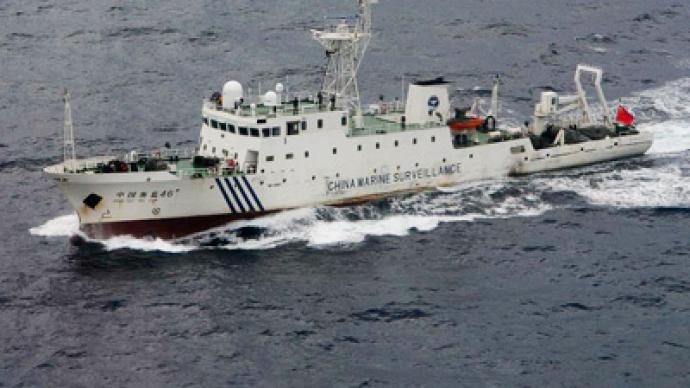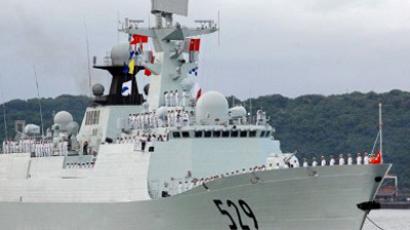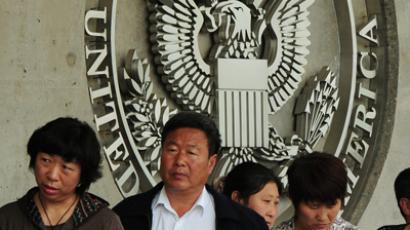‘Japan playing with fire:' Chinese warships deployed to disputed islands

Two Chinese patrol ships have been dispatched to a group of disputed islands following Tokyo’s announcement that it would purchase the isles from private owners. Beijing has vowed “reciprocal measures” should the situation escalate.
Two ships from the China Marine Surveillance (CMS) – a paramilitary maritime law enforcement agency – were dispatched to the tiny archipelago in the South China Sea “to assert the country’s sovereignty,” the official Chinese Xinhua News Agency said Tuesday.Xinhua said the vessels had reached the waters around the Diaoyu Islands — known in Japan as the Senkaku Islands —and would take the necessary measures to deal with “the development of the situation.”Chinese Defense Ministry Spokesman Geng Yansheng vowed the “government and armed forces stand firm and are unshakeable in their determination and will safeguard sovereignty over the nation's territories.""We are watching the evolution of the situation closely and reserve the right to take reciprocal measures," he continued.However, Japan’s coast guard said no special measures have been taken as a result of the Chinese patrol boats' deployment to the islands, though Tokyo monitoring any possible new developments. Japanese officials say it's unlikely that the Chinese vessels would come within 12 nautical miles of the islands – which would constitute an encroachment on Japanese territorial waters.Beijing summoned Japan’s ambassador to China late on Monday to protest Japan’s move to buy three of the five islands, which will become the responsibility of the Japanese coast guard if the plan goes through.The People's Liberation Army Daily also said in a commentary on Tuesday that Japan was playing with fire, calling the purchase the “most blatant challenge to China’s sovereignty since the end of World War II.”And as the rhetoric heats up, China has started broadcasting a daily weather report for the islands for the first time.Small demonstrations outside of the Japanese Embassy in Beijing followed the news, with a dozen or so demonstrators chanting “Japan, get out of China.” Similar protests were reported in two other cities in eastern and southern China.Taiwan, who has also laid claim to the islands, which are on a route to rich fishing grounds and potentially large maritime gas fields, recalled its envoy to Japan on Tuesday in response to Tokyo’s plan to nationalize them.Taiwan’s envoy was instructed to lodge a formal complaint with Tokyo, and is expected to return to Taipei on Wednesday.
Tokyo moves against Japanese nationalists, not Beijing
Japanese Foreign Minister Koichiro Gemba attempted to mitigate the blowback on Tuesday by reiterating the claim that the $26-million purchase served the "peaceful and stable maintenance of the islands."
Gemba urged calm, saying "we cannot damage the stable development of the Japan-China relationship because of that issue.”
Following the announcement to purchase the islands, Japanese Prime Minister Yoshihiko Noda, without specifically mentioning the territorial dispute, admitted that regional dynamics had left Japan in an increasingly precarious position.
"We have North Korea launching missiles under the name of satellites and conducting a nuclear program, China expanding its military might and continuing vigorous activities in regional waters, and Russia also boosting its activities in the Far East," Reuters cites him as saying.
Having found itself in such troubled waters, some experts believe Japan’s bid to purchase the islands is meant to stymie plans by Tokyo’s nationalist governor, Shintaro Ishihara, who had previously announced hopes of developing the islands. The country’s central government maintains that it will not develop the isles.
Japan incorporated the disputed islands in 1895, but ceded ownership following World War II, when the US took over administrative control. The US returned the islands to Japan in 1972, three after an expert revealed that oil reserves could be located under the sea in close proximity to the isles, reigniting China’s once dormant territorial claims.
“Ishihara put the national government in a very difficult spot. He pushed them into doing this now,” Sheila Smith, a senior fellow at the Council on Foreign Relations in Washington, told AP. Smith says the three parties involved should see the move as an attempt by Tokyo to derail Ishihara’s plans.Ishihara for his part reiterated calls to develop the islands for use by fisherman.Chinese authorities, who regularly exaggerate statements regarding Japan for domestic consumption, at least publicly have no intentions of backing down, whatever Japan’s intentions, especially in an area where it might appear that a territorial claim is being solved unilaterally.But while nationalists on both sides are seen as a potentially destabilizing force, experts believe both sides have no intention of seriously damaging economic times over the issue.














